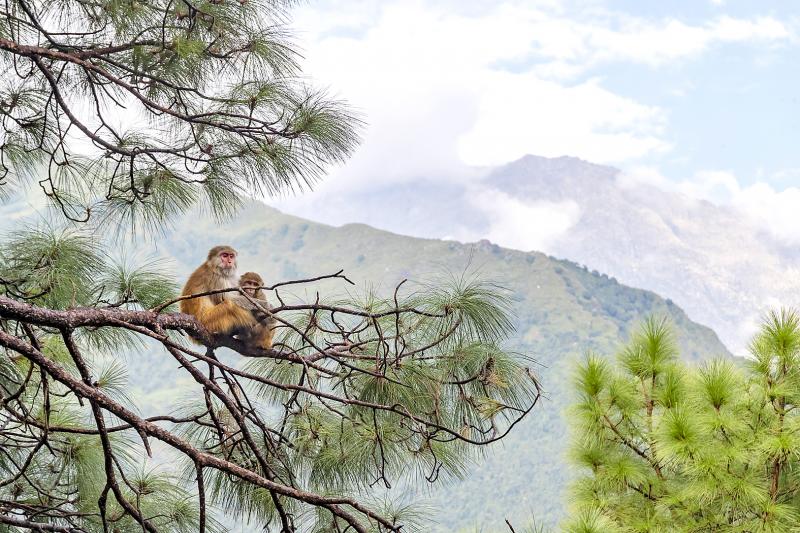Thousands of monkeys are menacing the historic Indian city of Shimla, where sterilizations and illegal poisonings have failed to blunt their frequent attacks on tourists and farms.
During India’s nationwide COVID-19 lockdown, most of the macaques left the city for the countryside to look for food.
As restrictions have eased, they have returned to bully inhabitants and snatch grocery bags, and up to 50 troops of hungry monkeys now prowl the former colonial British summer escape in the Himalayan hills.

Photo: AP
The city of 160,000 people has long been a major draw for tourists seeking to avoid India’s searing summer heat, but the food waste they leave behind has become a magnet for the hungry simians.
Nand Lal showed reporters his wounds from one altercation with the animals this month.
“I was passing a group of monkeys when the dominant male suddenly attacked me and three others piled in,” said the 46-year-old, who required multiple anti-rabies injections after the assault.
“Luckily I could grab a stick and fight them off. I had bruises all over my face and head. I was bleeding from a bite on my back,” he said.
Days after the assault, Lal said that he could still hear the “chattering” of his attackers and the two dozen other monkeys that watched.
“People are very scared and they don’t know what to do,” said retired High Court judge Kuldeep Chand Sood, who pointed to a bite on his leg inflicted as he sat reading on the terrace of his home.
“I was just going through my book when suddenly a big monkey attacked and bit me,” he said at his home in the macaque-infested Sanjauli district.
Many Sanjauli homes now have metal cages over their terraces and windows to keep out the invaders, who have even been known to steal from refrigerators.
Rajesh Sharma, a government wildlife officer in Shimla, said that garbage bins overflowing with food attract the animals.
Improving trash collection has meant “the monkeys are finding it harder, but their habits are the same,” Sharma said.
They now try to snatch any packet they see in anyone’s hand,” she said.
“If they don’t find it, they try and bite someone,” she added.
Even tourists at the Jakhoo temple, which holds one of India’s largest statues of the monkey god Hanuman, have had glasses and other shiny items stolen.
When not targeting humans, the estimated 130,000-plus monkeys in the state are stealing or destroying millions of dollars of fruit and crops each year from farms.
While Hindus consider monkeys sacred, the government has now said that the animals can be killed if they threaten property.
In Shimla and other towns in the state, the authorities have sought to sterilize the monkeys in a bid to bring numbers down.
About 157,000 of the animals have been sterilized across Himachal Pradesh state in the past few years, in what one expert said was the “only way” to bring the problem under control.
“If we kill monkeys, like some who poison monkeys, that can pose a threat to humans and other wild animals as well,” said Pooja Kanwar, a specialist at the Shimla monkey sterilization center.

Drug lord Jose Adolfo Macias Villamar, alias “Fito,” was Ecuador’s most-wanted fugitive before his arrest on Wednesday, more than a year after he escaped prison from where he commanded the country’s leading criminal gang. The former taxi driver turned crime boss became the prime target of law enforcement early last year after escaping from a prison in the southwestern port of Guayaquil. Ecuadoran President Daniel Noboa’s government released “wanted” posters with images of his face and offered US$1 million for information leading to his capture. In a country plagued by crime, members of Fito’s gang, Los Choneros, have responded with violence, using car

CYBERCRIME, TRAFFICKING: A ‘pattern of state failures’ allowed the billion-dollar industry to flourish, including failures to investigate human rights abuses, it said Human rights group Amnesty International yesterday accused Cambodia’s government of “deliberately ignoring” abuses by cybercrime gangs that have trafficked people from across the world, including children, into slavery at brutal scam compounds. The London-based group said in a report that it had identified 53 scam centers and dozens more suspected sites across the country, including in the Southeast Asian nation’s capital, Phnom Penh. The prison-like compounds were ringed by high fences with razor wire, guarded by armed men and staffed by trafficking victims forced to defraud people across the globe, with those inside subjected to punishments including shocks from electric batons, confinement

The team behind the long-awaited Vera Rubin Observatory in Chile yesterday published their first images, revealing breathtaking views of star-forming regions as well as distant galaxies. More than two decades in the making, the giant US-funded telescope sits perched at the summit of Cerro Pachon in central Chile, where dark skies and dry air provide ideal conditions for observing the cosmos. One of the debut images is a composite of 678 exposures taken over just seven hours, capturing the Trifid Nebula and the Lagoon Nebula — both several thousand light-years from Earth — glowing in vivid pinks against orange-red backdrops. The new image

Canada and the EU on Monday signed a defense and security pact as the transatlantic partners seek to better confront Russia, with worries over Washington’s reliability under US President Donald Trump. The deal was announced after a summit in Brussels between Canadian Prime Minister Mark Carney and European Commission President Ursula von der Leyen and European Council President Antonio Costa. “While NATO remains the cornerstone of our collective defense, this partnership will allow us to strengthen our preparedness ... to invest more and to invest smarter,” Costa told a news conference. “It opens new opportunities for companies on both sides of the